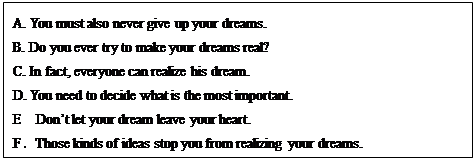题目内容
We have no idea about men first began to use salt. But we do know that it had been used in many different ways the history. For example, in many history books it is
that people who lived three thousand years ago ate salted fish. Thousands of years ago in Egypt, salt keep the dead. It can keep the dead bodies decay(腐烂).
In the eighteenth century, a person who stole salt was thought to broken the law. If a person was caught stealing salt, he would be thrown into prison. Books also record that in England about ten thousand people were put into prison during that century stealing salt! In the year 1553, if a man took than his share of salt, he would be thought to have broken the law and would be punished(惩罚).
Salt was very important on the dinner table of a king. It was always put the king when he sat down to eat. Then important visitors sat near the salt less important visitors were given seats farther away from it.
that people who lived three thousand years ago ate salted fish. Thousands of years ago in Egypt, salt keep the dead. It can keep the dead bodies decay(腐烂).
In the eighteenth century, a person who stole salt was thought to broken the law. If a person was caught stealing salt, he would be thrown into prison. Books also record that in England about ten thousand people were put into prison during that century stealing salt! In the year 1553, if a man took than his share of salt, he would be thought to have broken the law and would be punished(惩罚).
Salt was very important on the dinner table of a king. It was always put the king when he sat down to eat. Then important visitors sat near the salt less important visitors were given seats farther away from it.
| 小题1: |
|
| 小题2: |
|
| 小题3: |
|
| 小题4: |
|
| 小题5: |
|
| 小题6: |
|
| 小题7: |
|
| 小题8: |
|
| 小题9: |
|
| 小题10: |
|
小题1:A
小题2:A
小题3:C
小题4:B
小题5:B
小题6:D
小题7:B
小题8:C
小题9:C
小题10:D
试题分析:这篇短文主要讲述了盐对于人类生活的重要作用以及在人类历史上的重要价值。
小题1:考查词组及语境的理解。A. when什么时候;B. where哪儿;C. what什么;D. which哪一个;联系下文,可知此处指的是我们不知道什么时候,人类开始使用盐。故选择A。小题2:
考查连词及语境的理解。A. throughout贯穿,遍及; B. thought思考,认 C. though虽然,尽管; D. although虽然,尽管。联系下文,可知此处指的是在整个历史当中,故选择A。小题3:
考查动词及语境的理解。A. say说; B. reported报道;C. recorded记录;D. reading阅读;根据句意:据记载在许多历史书当中,结合语境可知需用被动语态,故选择C。小题4:
考查词组及语境的理解。be used to sth习惯于某事;used to do sth过去常常做某事. sth be used to do sth某物被用来做某事。结合语境可知盐被用来保存死人,应用被动语态,故选择B。小题5:
考查词组及语境的理解。keep from组织,抑制,结合语境可知盐能阻止尸体腐烂,故选B。小题6:
考查动词的时态及语境的理解。联系上文,可知偷东西已经被认为违反了法律,故选D。小题7:
考查连词及语境的理解。A. because.因为,后面接从句;B. because of因为,后面接短语;C. by通过;D. as作为;联系下文,可知这些人是因为偷盐被投入监狱,故选择B。小题8:
考查形容词及语境的理解。A. fewer较少的(修饰可数名词,有否定含义,几乎没有);B. less较少的(修饰不可数名词,有否定含义,几乎没有);C. more更多的;D. most最多的,结合语境可知此处指的是超过他的盐的份额,故选择C。小题9:
考查介词及语境的理解。A. after在……以后;B. behind在……的后面;C. in front of在……的前面(无范围);D. in the front of在……的前面(有范围),结合语境可知此处指的是放在国王前面,故选C。小题10:
考查连词及语境的理解。A. when在……时;B. as作为;C. however然而;D. while与……同时,而;联上下文,故选择D。
练习册系列答案
相关题目
